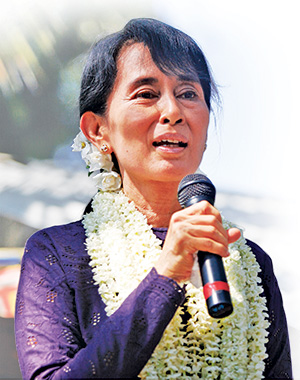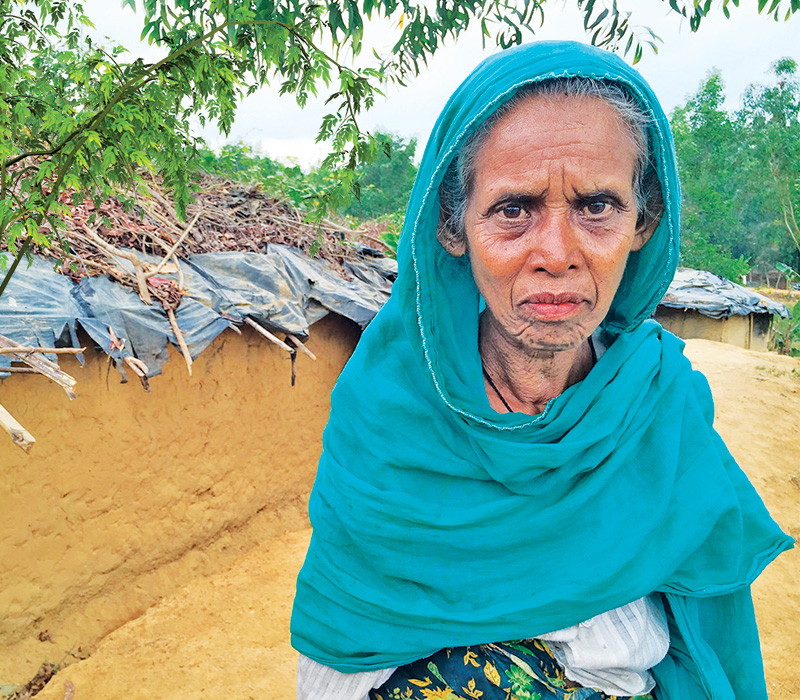Chapter 19 - Rohingyas' Uncertain Fate Post-Polls
This article was published in New Strait Times on November 20th, 2015.
This column has frequently spoken of the drama of the people of Myanmar. It has many times described how, in the wake of the clashes in 2012, Rohingya Muslims were exposed to genocide, abandoned on the high seas while trying to escape the country in rickety boats, had their Myanmar citizenship taken away and were deprived of their human rights.
Those aware of the drama of the Rohingya Muslims will realize what the general election in Myanmar last week will mean to these people.
Myanmar has recently emerged from a junta regime lasting some 50 years. Although elections in 2010 in theory put an end to the military regime in question, the presence of a junta that backed the ruling party could still always be felt.
Last week's elections, however, resulted in a major success for the National League for Democracy (NLD), under opposition leader Aung San Suu Kyi. However, that success does not mean that the country is now fully democratic.
While the people choose 75 per cent of the deputies who will now enter Parliament, the remaining 25 per cent are appointed by the military. It, therefore, appears impossible for the leading party in Parliament to be able to get laws through Parliament or introduce reforms. It can be seen that every step toward renewal will be vetoed by the military.
Suu Kyi is a leader who in fact emerged victorious from the 1990 elections. Despite obtaining an 80 per cent majority in Parliament, the junta refused to recognize the election results and sentenced Suu Kyi to house imprisonment.
She spent 15 years imprisoned, until 2010. Although the junta has now in theory come to an end, there are still worries that Suu Kyi's success will again be met by a coup. Although Thein Sein, who took over from the junta regime in 2010, says, "We must accept our voters' desire", many analysts still think that the military will hold Sein's moderate views responsible for this unexpected outcome and will make their displeasure felt.1
But what do these results mean for the Rohingyas?
 |
| The NLD leader, Aung San Suu Kyi |
Let us go back to before the elections. Following the clashes that broke out in 2012, and ended in the deaths of hundreds of Rohingyas in the country, many Rohingya Muslims were forced from their homes and workplaces and taken into refugee camps.
The Myanmar government prevented them from moving within the country and receiving services such as health and education. At the beginning of the year, the government revoked their identity documents, alleging that the Muslim minority were not Myanmar citizens.
The Rohingyas were, therefore, unable to stand or vote in this year's November elections. As a result, for the first time, there are no Muslims in the Myanmar Parliament.
While the Rohingyas are pleased at the fall of the existing regime, they are also not entirely happy with Suu Kyi, of whom they had high hopes in the past. The main reason for this is the way she avoided using the term "Rohingya" and refused to visit areas with Rohingya populations during the election campaign.
It did not escape attention that she glossed over the subject whenever Rohingya was mentioned and described the question of minority rights as a "sensitive issue" that should be treated "very carefully".2
Many Rohingyas criticize that as a policy adopted in order to avoid losing the Buddhist vote. Looking at the general condition in the country from the outside and as a whole, this political maneuver can be interpreted in different ways.
It is always hard in a country ruled by a junta to keep the balance and advocate the rights of those the junta does not want. In countries such as Myanmar, where the junta has in practice not come to an end and that have no qualms about resorting to violence and torture, the most rational course is always to avoid risky moves that might incite further upheaval or sparks.
Had Suu Kyi emphasized the rights of the Rohingyas before the election, that would probably have elicited a reaction from the military. Bearing in mind the conditions in the country it should not be regarded as unreasonable that Suu Kyi should have adopted a different pre-election tactic. The only way of confirming these criticisms or otherwise is the course that Suu Kyi follows from now on.
Although her party lacks the strength to act outside the military constitution and thus to bring in serious reforms, she has now a greater capacity to prevent injustice and genocide in the country and to bring the subject to the attention of the international community.
By following a sensible policy, Suu Kyi can bring the matter of genocide in Myanmar to the constant attention of the international community. In practical terms, international pressure can bring about a solution in Myanmar.
Let us add that very little has changed in the lives of the Rohingyas up to the election. The United Nations says that 370 Rohingyas drowned in the sea between January and June this year. According to Amnesty International, however, the actual figure is very much higher. Witnesses state that dozens of boats have set out from the shore, but that only a few have reached Indonesia or Malaysia.3 In other words, the drama of the Rohingyas is continuing beneath the radar.
We hope that this new period will be an auspicious one for the Rohingyas, who have been persecuted, deprived of their human rights and subjected to genocide. We will also continue to pray and speak for them in these pages.
 |
Footnotes
1. http://www.theguardian.com/world/2015/nov/09/myanmar-election-result-military-aung-san-suu-kyi-govern-analysis
2. http://foreignpolicy.com/2015/10/22/myanmar_rohingya_violence_election_aung_san_suu_kyi/
3. http://www.telegraph.co.uk/news/worldnews/asia/burmamyanmar/11942819/Burma-election-Rohingya-Muslims-look-to-sea-not-ballot-box-as-new-wave-of-Asian-boat-people-prepares-to-flee.html
- Introduction - When the Migration Wave Starts to Wash Ashore
- Chapter 01 - Open Letter to the Burmese (Myanmar) Administration
- Chapter 02 - Events in Myanmar Are Crime Against Humanity
- Chapter 03 - A Cry for Help to the U.N. from Rohingya of Myanmar
- Chapter 04 - Behind the Persecution in Myanmar
- Chapter 05 - Myanmar Should Beware of Radicalism
- Chapter 06 - Deafening Silence over Rohingya Issue
- Chapter 07 - Rohingya People Ignored by Myanmar Government
- Chapter 08 - Why Does the World Turn a Blind Eye on Children's Cries Coming from a Far Corner in Southeast Asia?
- Chapter 09 - Are the Rohingyas Doomed to Remain Stateless?
- Chapter 10 - The Rohingya Muslims Are Being Exiled in Their Own Lands
- Chapter 11 - Differences Can Become Richness
- Chapter 12 - What If You Didn't Have Even an Inch of Land to Live on in This World?
- Chapter 13 - Not the Rohingya Crisis, but a Crisis of Humanity
- Chapter 14 - Are the People of Rakhine Condemned to Be Oppressed in the Countries to Which They Flee?
- Chapter 15 - Being a Muslim Woman in Myanmar
- Chapter 16 - How Does It Feel to Be a Rohingya?
- Chapter 17 - Small Steps That Could Make a Big Difference
- Chapter 18 - The Only Solution to the Refugee Crisis That Shook the World
- Chapter 19 - Rohingyas' Uncertain Fate Post-Polls
- Chapter 20 - Time for Global Community to Step up for Myanmar's Muslims
- Chapter 21 - Humans Have Rights on Paper, but Apparently Not in Real Life
- Chapter 22 - The Forgotten Rohingya
- Conclusion - Unity among Muslims Is the Most Vital Issue
